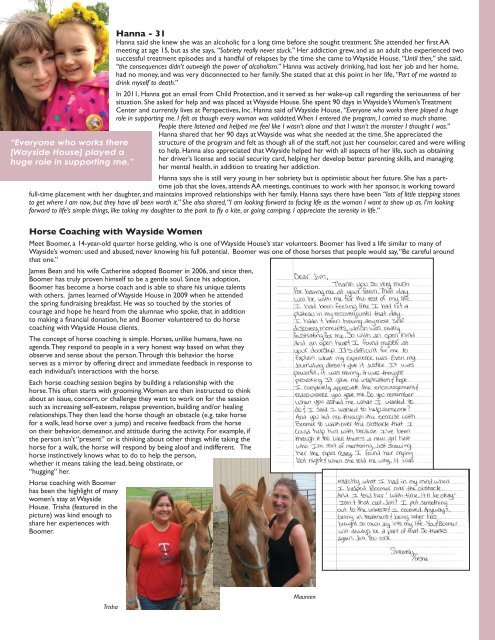Mental Health - The Wayside House, Inc.
Mental Health - The Wayside House, Inc.
Mental Health - The Wayside House, Inc.
Create successful ePaper yourself
Turn your PDF publications into a flip-book with our unique Google optimized e-Paper software.
“Everyone who works there<br />
[<strong>Wayside</strong> <strong>House</strong>] played a<br />
huge role in supporting me.”<br />
Hanna - 31<br />
Hanna said she knew she was an alcoholic for a long time before she sought treatment. She attended her fi rst AA<br />
meeting at age 15, but as she says, “Sobriety really never stuck.” Her addiction grew, and as an adult she experienced two<br />
successful treatment episodes and a handful of relapses by the time she came to <strong>Wayside</strong> <strong>House</strong>. “Until then,” she said,<br />
“the consequences didn’t outweigh the power of alcoholism.” Hanna was actively drinking, had lost her job and her home,<br />
had no money, and was very disconnected to her family. She stated that at this point in her life, “Part of me wanted to<br />
drink myself to death.”<br />
In 2011, Hanna got an email from Child Protection, and it served as her wake-up call regarding the seriousness of her<br />
situation. She asked for help and was placed at <strong>Wayside</strong> <strong>House</strong>. She spent 90 days in <strong>Wayside</strong>’s Women’s Treatment<br />
Center and currently lives at Perspectives, <strong>Inc</strong>. Hanna said of <strong>Wayside</strong> <strong>House</strong>, “Everyone who works there played a huge<br />
role in supporting me. I felt as though every woman was validated. When I entered the program, I carried so much shame.<br />
People there listened and helped me feel like I wasn’t alone and that I wasn’t the monster I thought I was.”<br />
Hanna shared that her 90 days at <strong>Wayside</strong> was what she needed at the time. She appreciated the<br />
structure of the program and felt as though all of the staff, not just her counselor, cared and were willing<br />
to help. Hanna also appreciated that <strong>Wayside</strong> helped her with all aspects of her life, such as obtaining<br />
her driver’s license and social security card, helping her develop better parenting skills, and managing<br />
her mental health, in addition to treating her addiction.<br />
Hanna says she is still very young in her sobriety but is optimistic about her future. She has a parttime<br />
job that she loves, attends AA meetings, continues to work with her sponsor, is working toward<br />
full-time placement with her daughter, and maintains improved relationships with her family. Hanna says there have been “lots of little stepping stones<br />
to get where I am now, but they have all been worth it.” She also shared, “I am looking forward to facing life as the woman I want to show up as. I’m looking<br />
forward to life’s simple things, like taking my daughter to the park to fl y a kite, or going camping. I appreciate the serenity in life.”<br />
Horse Coaching with <strong>Wayside</strong> Women<br />
Meet Boomer, a 14-year-old quarter horse gelding, who is one of <strong>Wayside</strong> <strong>House</strong>’s star volunteers. Boomer has lived a life similar to many of<br />
<strong>Wayside</strong>’s women: used and abused, never knowing his full potential. Boomer was one of those horses that people would say, “Be careful around<br />
that one.”<br />
James Bean and his wife Catherine adopted Boomer in 2006, and since then,<br />
Boomer has truly proven himself to be a gentle soul. Since his adoption,<br />
Boomer has become a horse coach and is able to share his unique talents<br />
with others. James learned of <strong>Wayside</strong> <strong>House</strong> in 2009 when he attended<br />
the spring fundraising breakfast. He was so touched by the stories of<br />
courage and hope he heard from the alumnae who spoke, that in addition<br />
to making a fi nancial donation, he and Boomer volunteered to do horse<br />
coaching with <strong>Wayside</strong> <strong>House</strong> clients.<br />
<strong>The</strong> concept of horse coaching is simple. Horses, unlike humans, have no<br />
agenda. <strong>The</strong>y respond to people in a very honest way based on what they<br />
observe and sense about the person. Through this behavior the horse<br />
serves as a mirror by offering direct and immediate feedback in response to<br />
each individual’s interactions with the horse.<br />
Each horse coaching session begins by building a relationship with the<br />
horse. This often starts with grooming. Women are then instructed to think<br />
about an issue, concern, or challenge they want to work on for the session<br />
such as increasing self-esteem, relapse prevention, building and/or healing<br />
relationships. <strong>The</strong>y then lead the horse though an obstacle (e.g. take horse<br />
for a walk, lead horse over a jump) and receive feedback from the horse<br />
on their behavior, demeanor, and attitude during the activity. For example, if<br />
the person isn’t “present” or is thinking about other things while taking the<br />
horse for a walk, the horse will respond by being aloof and indifferent. <strong>The</strong><br />
horse instinctively knows what to do to help the person,<br />
whether it means taking the lead, being obstinate, or<br />
“hugging” her.<br />
Horse coaching with Boomer<br />
has been the highlight of many<br />
women’s stay at <strong>Wayside</strong><br />
<strong>House</strong>. Trisha (featured in the<br />
picture) was kind enough to<br />
share her experiences with<br />
Boomer.<br />
Trisha<br />
Maureen


